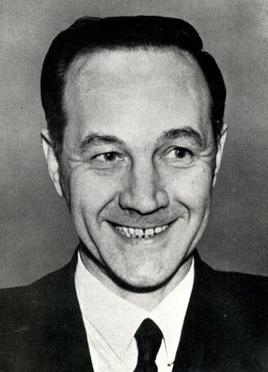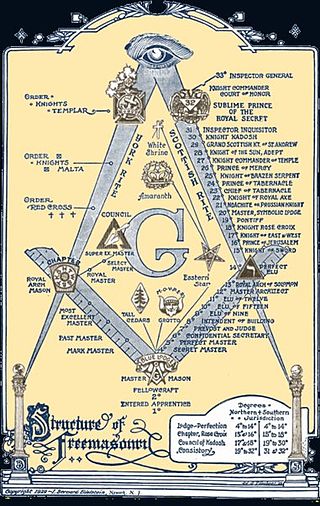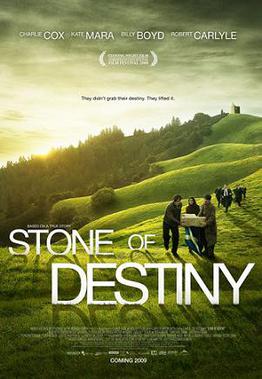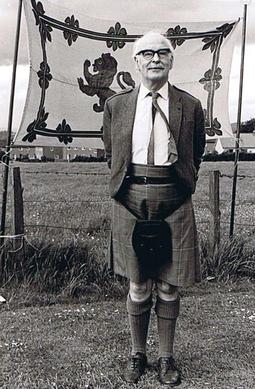Related Research Articles

Year 1306 (MCCCVI) was a common year starting on Saturday of the Julian calendar.

The Stone of Scone is an oblong block of red sandstone that was used in the coronation of Scottish monarchs until the 13th century, and thereafter in the coronation of English and later British monarchs. The Stone measures 26 by 16.7 by 10.5 inches and weighs approximately 335 lb. A cross is roughly incised on one surface, and an iron ring at each end aids with transport. Monarchs sat on the Stone of Scone itself, until a wooden platform was added to the Coronation Chair in the 17th century.
The National Party of Scotland (NPS) was a centre-left political party in Scotland which was one of the predecessors of the current Scottish National Party (SNP). The NPS was the first Scottish nationalist political party, and the first which campaigned for Scottish self-determination.

The 79 Group was a faction within the Scottish National Party (SNP), named after its year of formation, 1979. The group sought to persuade the SNP to take an active left-wing stance, arguing that it would win more support, and were highly critical of the established SNP leaders. Although it had a small membership, the group caused sufficient disquiet that it was expelled from the SNP in 1982, although its members were subsequently readmitted and many attained senior positions in the Scottish Government after 2007. Alex Salmond, a leading member of the group, later became First Minister from 2007 to 2014.

The Scottish Republican Socialist Movement (SRSM) is a political organisation that was formed out of the now defunct Scottish Republican Socialist Party (SRSP), a political party that operated in Scotland.

John MacDonald MacCormick was a Scottish lawyer, Scottish nationalist politician and advocate of Home Rule in Scotland.

Scottish nationalism promotes the idea that the Scottish people form a cohesive nation and national identity.
The Scottish Renaissance was a mainly literary movement of the early to mid-20th century that can be seen as the Scottish version of modernism. It is sometimes referred to as the Scottish literary renaissance, although its influence went beyond literature into music, visual arts, and politics. The writers and artists of the Scottish Renaissance displayed a profound interest in both modern philosophy and technology, as well as incorporating folk influences, and a strong concern for the fate of Scotland's declining languages.

There are many organisations and orders which form part of the widespread fraternity of Freemasonry, each having its own structure and terminology. Collectively these may be referred to as Masonic bodies, Masonic orders, Concordant bodies or appendant bodies of Freemasonry.

Stone of Destiny is a 2008 Scottish-Canadian historical adventure comedy film written and directed by Charles Martin Smith and starring Charlie Cox, Billy Boyd, Robert Carlyle, and Kate Mara. Based on real events, the film tells the story of the removal of the Stone of Scone from Westminster Abbey. The stone, supposedly the Stone of Jacob over which Scottish monarchs were traditionally crowned at Scone in Perthshire, was taken by King Edward I of England in 1296 and placed under the throne at Westminster Abbey in London. In 1950, a group of Scottish nationalist students succeeded in liberating it from Westminster Abbey and returning it to Scotland where it was placed symbolically at Arbroath Abbey, the site of the signing of the Declaration of Arbroath and an important site in the Scottish nationalist cause.
Yes Scotland was the organisation representing the parties, organisations, and individuals campaigning for a Yes vote in the 2014 Scottish independence referendum. It was launched on 25 May 2012 and dissolved in late 2014 after Scotland voted against independence.
On 25 December 1950, four Scottish students from the University of Glasgow removed the Stone of Scone from Westminster Abbey in London and took it back to Scotland. The students were members of the Scottish Covenant Association, a group that supported home rule for Scotland. In 2008, the incident was made into a film called Stone of Destiny. It seems likely that the escapade was based on the fictional account of a plot by Scottish Nationalists to liberate the Stone of Destiny from Westminster Cathedral and to return it to Scotland, as told in Compton Mackenzie's novel The North Wind of Love Bk.1, published six years earlier in 1944.
Mary Fraser Dott was a Scottish nationalist political activist and founding member of the National Party of Scotland and the Scottish National Party. She was a candidate for the Edinburgh East by-election of 1947.

William Oliver Brown was a Scottish nationalist political activist.
Robert Gray, often known as Bertie Gray, was a Scottish nationalist politician.
Hugh MacDonald, also known as Uisdean MacDonald, was a Scottish nationalist activist.
James Michael Trevlyn Grieve was a Scottish journalist and political activist.
Major Frederick Alexander Colquhoun Boothby was a Scottish nationalist military and paramilitary leader.
Bo'ness Rebels Literary Society, was a Scottish nationalist organisation, and song collective, operating in Bo'ness, Scotland, between 1948 and 1976, with close links to the Scottish National Party, and its publications department. It was chaired by Mr William Kellock, who was an officer at the bank of Scotland in the town. Following their inaugural event in January 1948, they held events roughly every fews months, which were frequented by many famous Scots associated with the advancement of Scottish independence, the Scottish Renaissance and the Scottish Folk Revival. Namely Thurso Berwick, Hamish Henderson, Hugh MacDiarmid, Wendy Wood, Hugh MacDonald and Dr. Robert Mcintyre, among others. They continued to publish song books until late 1966.

Ronald MacDonald Douglas was the pseudonym of Ronald Edmonston (1896-1984), a Scottish author, actor and political figure known for his works compiling Scottish folklore and his involvement in the 1320 Club. Douglas was the editor of Catalyst, the magazine of the 1320 Club, following the removal of John Herdman.
References
- 1 2 3 4 5 6 Peter Barberis et al, Encyclopedia of British and Irish Political Organizations, p.409
- 1 2 3 4 Andrew Murray Scott and Iain Macleay, Britain's Secret War, pp.28-32
- 1 2 3 Christopher Harvie, Scotland and Nationalism: Scottish Society and Politics 1707 to the Present, p.172
- ↑ Gordon Wilson, SNP: The Turbulent Years, 1960-1990, p.42
- ↑ Ed. Michael Ekers et al, Gramsci: Space, Nature, Politics
- 1 2 Warwick Rodwell, The Coronation Chair and Stone of Scone, p.260
- ↑ Ed. Alan Norman Bold, The Letters of Hugh MacDiarmid, p.729
- ↑ Edward J. Cowan, For Freedom Alone: The Declaration of Arbroath